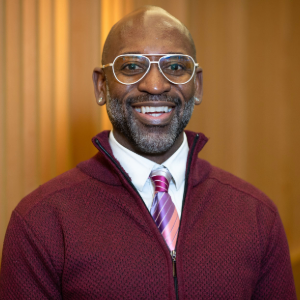
February 2024 Newsletter

February 2024 Newsletter

Staff Profile
Jagadīśa-devaśrī Dācus, PhD, is associate director of the Institute for Sexual and Gender Minority Health and Wellbeing (ISGMH) and a research assistant professor at Feinberg.
He received his Master of Science in Social Work (MSSW) with a concentration in advanced generalist practice and programming from the Columbia University School of Social Work and his doctorate in social welfare from The Graduate Center of City University of New York (CUNY).
In his current role as associate director of ISGMH, Dācus draws on more than 20 years of professional experience in senior-level nonprofit organization and government agency leadership to guide the institute. His research centers on HIV-seronegativity among Black sexual minority men.
Where is your hometown?
I was born in Denver, Colorado but grew up in Los Angeles, California.
What led you to Northwestern?
It was the fantastic opportunity to join the core faculty and to be part of the leadership of the Institute for Sexual and Gender Minority Health and Wellbeing (ISGMH). A well-known and -respected LGBTQ+ research institute. As a LGBTQ+ health researcher, coming to Northwestern and being able to collaborate with and work alongside some of the most foremost LGBTQ+ health researchers in the US was an opportunity I could not pass up. Additionally, I’d get to live in the wonderful city of Chicago.
What are you currently working on?
I am currently part of the Entre Herman@s Study, a study that engages Latinx herman@s to encourage their brothers to discuss health issues. The goal of the study is to develop a family-based intervention for Latinx people to help them engage their Latinx queer brother in conversations about vaccines and medication. I have the distinct pleasure of working with my esteemed colleague, Dr. Homero del Pino, who is based at Charles Drew University of Medicine and Science in Los Angeles. Additionally, I am gearing up to further my own research that focuses on HIV prevention with Black sexual minority men.
How does your work support the research enterprise at Feinberg?
My own program of research examines maintained seronegativity among Black sexual minority men, by taking a strengths-based approach and by using qualitative methods. In this regard, my work supports the broader research enterprise at Feinberg from the public health and wellness approach to research with populations and communities that have minoritized racial, sexual and gender identities.
Why do you enjoy working at Northwestern?
Besides being able to call myself a Chicagoan, I enjoy working at Northwestern because I am in an environment with colleagues who are not only professionally, but also personally, committed to improving the health and wellbeing of sexual and gender minority communities. I have enjoyed being part of the Northwestern community for nearly three years and I know it is a place in which I have a lot of opportunities to grow and advance professionally.